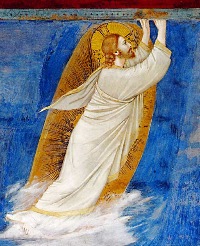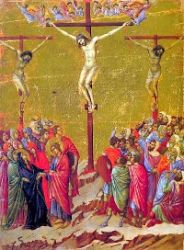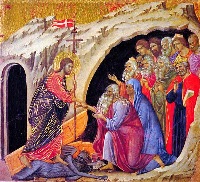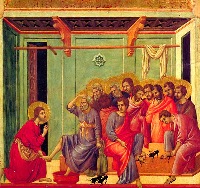The transcendence of the otherness
The mystery confessing Christ as next to God and present in history and inside all men teaches us the transcendence of the other: the other’s face
Jesus’ resurrection from the dead is his glorification, his exodus into the glory of God, his going to the Father who called him back from the dead in the power of the Holy Spirit. The resurrected Jesus is to be looked for where the Father is because by means of his resurrection the full divinization of his flesh and mission happened.
It is for this reason that neither the Gospel according to Matthew, nor the one according to John narrate Jesus’ ascension into heaven as a particular event, whereas Luke shows the ascension as the seal which puts an end to Jesus’ Easter apparitions. Forty days later — a symbolic number hinting at a concluded time, a time of wait and transition — Jesus manifested himself revealing his ascension to heaven, his new dwelling, his invisible presence in God. Is then Jesus’ ascension an abstraction, a separation from his disciples and community, or is it the revelation of a new relationship binding the resurrected Jesus to those who saw, heard and touched him (1 John 1:1) till they believed he is the Messiah, the one sent by God, the Son of God?
In truth, Jesus’ ascension into heaven, an event which cannot be narrated through our words which are able to tell only human facts, was neither a separation nor the conclusion of the story of Jesus’ life. As a matter of fact, if the narrations of the ascension are read with intelligence, it will be immediately clear that they don’t deal with a “farewell,” but rather with a sending of the disciples, a mission from Jerusalem to the ends of the earth. The disciples, gone into the whole world, will preach the Gospel to every creature (see Mark 16:15) and first of all they will make the experience of God’s nearness, of His presence; they will be aware of being just men and women at the service of Jesus’ mission, the one sent by the Father. Christ is taken up to where the Father is so that his work could be accomplished, so that he could be an intercessor for all the men among whom and with whom he dwelt as a true man on earth for about thirty seven years.
By now there is a new relationship between God and the mankind, because the separation between the earth and the sky, between the creator and the creature, became communion thanks to Jesus of Nazareth, the Son of God. “The heavens are the heavens of the Lord, but the earth he has given to men” (Psalms 115:16) sang the psalmist, but now this two realities join in Jesus Christ: as a matter of fact he descended from heaven to earth, he was in the form of God (Philippians 2:6) and he clothed himself in human and mortal flesh (John 1:14), in this human reality made up of a body, a psyche and a soul he suffered to death, he rose from the dead and he ascended to heaven in the flesh. Now “at the right hand of the Father,” i.e. in the intimacy of God’s life, there is a body of a man because in Christ heavens descended on earth and earth ascended into heaven. Jesus was really both the son of God and the son of man, able to be the Emmanuel for us, the God-with-us.
Yes, exactly the gospel according to Matthew had opened with the announcement of the coming of the Emmanuel, that is the God-with-us (see Matthew 1:22-23), of the God who comes by means of Jesus and now it ends with words which ensure that God’s presence among the men will go on: “I am with you, until the end of the age” (Matthew 28:20). Therefore the ascension is another way of catching Jesus’ victory over death because it allows us to distinguish Jesus next to the Father, and yet always among us. And by now in God there is a transfigured and glorified human body for us, a divinized human body in which death, and consequently all the evil powers, were won: “Who will bring a charge against God’s elect? — Paul the Apostle says — Who is the one who condemns? Perhaps Jesus Christ, who died, or rather rose from the dead, who sits at the right hand of God and intercedes for us?” (Romans 8:33-34).
A real presence in the physical absence, a relationship in the distance: this is the meaning of the ascension, which asks Christians to walk in the light of faith, not of sight (see 2 Corinthians 5:7), developing the sensitiveness of faith, the “spiritual senses,” i.e. the ability of the human heart to see, listen, touch, taste and smell. The mystery confessing Christ as next to God and present in history and inside all men teaches us the transcendence of the other: the other’s face, which is irreducibly his, evokes a mystery of transcendence and “beyondness” and asks for respect and communion. The ascension opposes all our greed and yearning for possession, both in the relationship with God and in the ones with the other men: this is really a great teaching of freedom.
Translated from:
ENZO BIANCHI
{link_prodotto:id=320}: Le feste cristiane,
Edizioni Qiqajon, 2003, pp. 97-99.




